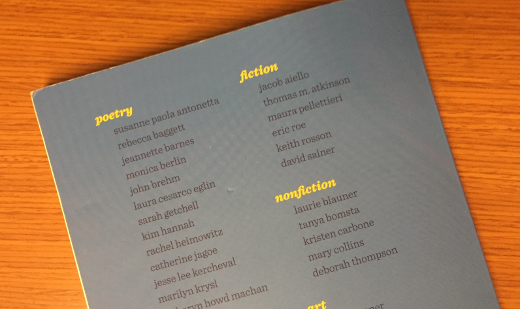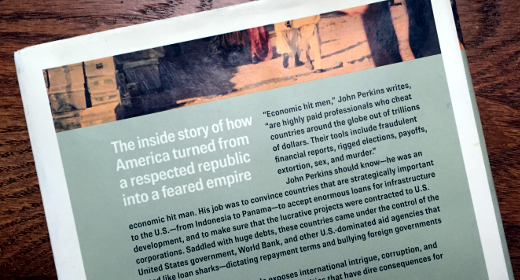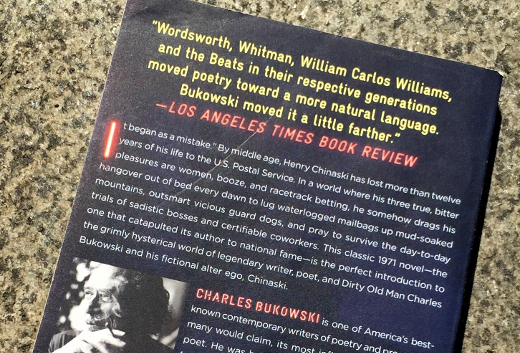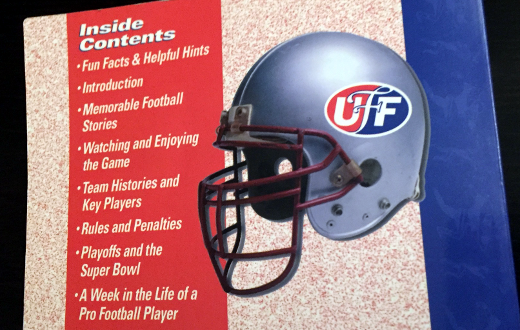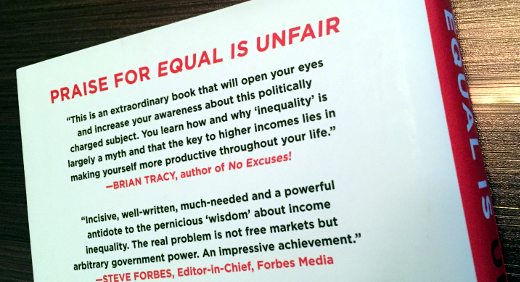My Takeaways From December Magazine Volume 27.2
Beyond the writing I have done here at The Hot Iron I have also explored more creative and expressive forms of writing. Don’t get me wrong, what I wrote about registering domain names for your children took a unique approach, but it’s not certainly something to curl up and read in bed.
With this in mind, I attended last year’s Printers Row Lit Fest in Chicago with a different lens and steps than previous times. Not only was this quest more fulfilling, but I spent most of the day there as well.
One of the first stops I made was at the table of December magazine, a biannual literary journal. The non-profit magazine has its roots in the Windy City but now hails from St. Louis. I was intrigued as this publication presents works from a variety of authors, some being their first published work. I subscribed on the spot – a mere $20 for a year – and got the current issue as a bonus. Later that day I tore into it, reading it cover to cover, all the while thinking, “hmmm.”
When the latest issue, volume 27.2, arrived, I was now 3 issues relatively new world of poetry and short stories, and as you may have already guessed I have some takeaways from reading this edition and the others of December magazine.
Poetry is more than what I was taught in school – First I have to say when I say “school” I stop at high school, as my college experience had me mostly in the computer lab. I was taught poetry was about structure and rhyming. So as I grew up, if it didn’t have a set structure or rhyme, it wasn’t a poem. Granted much of the lyrics of the songs I grew up listening to didn’t always rhyme either, but I must have been too busy singing and moshing to them to notice.
The drama is in the details – The greatest thing I have enjoyed of the many short stories I have read has been how details of whatever story is being told, from gripping to mundane, come alive as the details are being revealed. It’s like peeling layers of the onion to reveal more connection to the story. That zoom in on the details, or lack thereof, can make or break a story.
I can do this – Enough said there… I’ll stop this takeaway, wrap up and get back to an idea for a short story that has been simmering in my head.
Upon further perusing the Lit Fest that day I found many, many other periodicals similar to December magazine. Rather than collect them all, I stuck with one, one I just renewed for another year of unique reading and inspiration.
As I give away books as I read them, I did the same for this issue of December magazine. Rather than directly giving it to someone, I simply left it on a Chicago CTA Red Line subway car one morning. I only hope the person who happened upon it enjoyed it as much as I did.
Do you read any literary journals? Perhaps December magazine? I welcome your thoughts in the comments of this post.
This is from The Hot Iron, a journal on business and technology by Mike Maddaloni.
Did you enjoy this? Subscribe to The Hot Iron by RSS/XML feed or Read by Email.
Book Take-Aways • Strategize • (2) Comments • Permalink
My Takeaways From The Book Confessions Of An Economic Hit Man
Everything happens for a reason. That phrase is something I have always believed in. Even if I don’t know what that reason is, or don’t believe the reason when I hear it, I have always felt that somewhere, someone knows why something happened.
This phrase came to mind as I read the 2004 novel Confessions of an Economic Hit Man by John Perkins. The book, which he says is truly that, his confession – is about how corporations have worked and continue to work on behalf of the US government to gain influence, allies and assets from other countries for the benefit of said corporations and the US government, but not necessarily for the countries they are purporting to help.
As you might guess, Perkins states he was an economic hit man, or EHM. The book is the story of his life from growing up in New Hampshire to being offered the role and traveling the world doing the bidding of others through the consulting firm he worked for. When successful, he benefitted greatly. When not, he still got paid, but then handed the work off to others to get the job done, presumably at any cost.
As I read this tale of international intrigue, many thoughts swirled through my head, including the following takeaways.
Act Locally – Perkins traveled the world as an EHM. He didn’t do it sitting behind a desk in his Boston office. Granted this was the 1970’s and 1980’s and you didn’t have the tools of the Internet we have today. But if you want to be effective and close the deal, you have to directly connect with others, on their turf. I have done this before and in the case of an EHM, for good or bad.
Tell Your Story Well – With a topic like this, it is easy to dismiss it as a farce and conspiracy theory without even reading one word of it, Now I am not saying this story is 100% true, as I have no clue. I am simply absorbing what the author wrote. But what he wrote, though, is a well-told story where he ties world events in with his own tale. If it is 100% false, then he is an amazing fiction writer.
Everything Happens For a Reason – See what I wrote above. What Perkins wrote about may or may not be the reason – again, I don’t have any special insight, I can only take him for his word. Then again, what I’ve seen in headlines over the years, my hunch is there is more to the truth than fiction. And as Mark Twain once said, truth is stranger than fiction.
If you have any interest in current affairs, world politics or simply love a great story, I recommend Confessions of an Economic Hit Man. I bought this book myself, and as I pass along all books I read, this one is going to a good friend who is an international consultant who himself has traveled to all corners of the planet. Is he an EHM itself? I don’t know, and if he is I’m not sure I even want to know for sure.
Have you read this book by John Perkins? If so, what did you think? I welcome all thoughts in the comments to this post.
This is from The Hot Iron, a journal on business and technology by Mike Maddaloni.
Did you enjoy this? Subscribe to The Hot Iron by RSS/XML feed or Read by Email.
Book Take-Aways • Strategize • (0) Comments • Permalink
My Takeaways From the Novel Post Office By Charles Bukowski
People learn about books and authors from a variety of sources – friends, social media, browsing airport stores, the New York Times Bestseller list... just to name a few. I first learned about writer and poet Charles Bukowski in a much different way – a bar.
The Bukowski Tavern is a quaint place tucked into the corner of a parking garage complex that also houses a high-end bowling alley and seafood restaurant in Boston’s Back Bay neighborhood. The long, narrow joint serves a great selection of beers and has a kitchen, the latter which made “The Buk” a favorite lunch spot for me when I worked nearby several years ago. That, and the fact my co-workers didn’t like it, made me a frequent patron as a getaway from my daily grind.
On the walls of Bukowski Tavern are paintings of the image of its namesake as well as quotes from his books. One would think by being immersed in such a locale would drive me to want to read his collection of books and poems. One would think, but that was then when curling up with a good book meant sticking my nose in a technical manual. That was then, this is now, and I have finally begun reading Bukowski’s work.
Post Office was his first novel, written later in his life after publishing numerous short stories and poems and, as you might guess, working for the U.S. Postal Service. It is a gritty, real-life tale, yet written in a compelling way to hold the reader through the hard-drinking life and times of a mail carrier. As I read and absorbed this piece, the following takeaways came to mind.
The topic can be mundane – Working, drinking, bad relations... these don’t necessarily jump out at you as topics you want to read about. As I made it through the pages of Post Office, the vivid story presented in front of me became as if I was watching it, and made for an entertaining use of my time. It fulfills the expression that it’s not what you say, it’s how you say it.
Read something different – A short perusal of the other book takeaways I have written here at The Hot Iron shows a variety of books, but few of them are fiction. This is not to dismiss the gripping and compelling business books I tend to gravitate to, but as I read Post Office it reminded me I need to mix it up more.
Write, right now – Post Office was written and published when Bukowski was 49. I am 49. Granted he had written many, many poems and short stories for many years. Where I won’t equate my own little blog as an equivalent, as I have written the 800+ posts here over the last decade, I have gained a great appreciation and love of writing, and it’s time to get those books out of my head and into a more tangible format.
As you might guess, Post Office is far from a children’s novel. I highly recommend it for anyone who is not easily offended by language, and loves a good, real story. I gave this book to a friend who is a huge reader but has never read Charles Bukowski himself. It was easier to hand the book over to him than to fly him out to Boston to the bar, though the latter would be much more fun.
If you have read Post Office or any of Bukowski’s other works, I’d welcome your thoughts in the comments to this post. I am now ordering his second book, Factotum.
This is from The Hot Iron, a journal on business and technology by Mike Maddaloni.
Did you enjoy this? Subscribe to The Hot Iron by RSS/XML feed or Read by Email.
Book Take-Aways • Thrive • (2) Comments • Permalink
My Takeaways From The Ultimate Female Fan Guide to Pro Football
The Super Bowl is a game you prepare for mentally, physically or both – depending on your level of fandom, and what you are watching it for. It is unique among sports as even non-fans watch, for the commercials, because they are at parties, for curiosity sake, et. al.
If you are a football fan, you realize the complexity of the rules of the game – realize in that you understand them all, none of them, or as many are, somewhere in between. How much you may know is most likely influenced by if you played football, was taught by a parent or someone else close to you or you learned on your own… he latter being the case for myself. Football for me wasn’t my first love of sports, but has become it. I grew up a baseball fan, which came from my Mom’s love of the Boston Red Sox. While I was growing up, the New England Patriots were horrible, and the bottom rung of the sports ladder in New England, way behind the Sox, Boston Celtics and Boston Bruins.
So when I decided on a whim to get season tickets for the Patriots back in the early 90’s, before they became the multiple Super Bowl winning team they are now, where I had some knowledge of the game, I had much to learn. As I was in my mid-20’s at that time, I was a little embarrassed that I didn’t know more of the game, and sought out a way to learn it. I found a book that not only helped me then, but over 20 years later as well.
I found the book The Ultimate Female Fan Guide to Pro Football at the Patriots Pro Shop, which was adjacent to the team’s former home field, Foxboro Stadium. Flipping through it, I realized it was exactly what I needed to learn the game. Two decades later I found it among some things, and I dusted it off and re-read it. My takeaways, as follow, come from my recollection of my initial read as well as this recent unearthing of it.
Structured Learning Is Sometimes Better Than On-The-Task Learning – As most of my training and learning over my career has been on-the-job or just-in-time and supplemented by some training, depending on the topic structured learning is the better way, as it was for me with football. Simply sitting down and watching 60 minutes of plays over 3 hours may not even cover everything, and taking a methodical approach supplemented with watching the game helped me learn it well.
Anecdotal Information Provides Greater Context To Formal Knowledge – Learning the formal rules of football, like any other topic, is important to learning about what you are watching. But for a game like football which has evolved over close to 100 years, having familiarity of the evolution and events which led to where the game is today is great to the deep understanding of the game. Betsy Berns mixes helpful hints and fun facts throughout the pages of The Ultimate Female Fan Guide to Pro Football, all of which provide greater context to the main information presented.
What Taught Me Helps Teach Others - When I found the book, I wanted to go through it again as I am teaching my daughter the rules of football. As I am writing this I am sitting down with her and we are going through it together, and I am helping her understand both the rules for and my love for the game, which I hope will lead to her own appreciation and affection for it too.
As my copy of The Ultimate Female Fan Guide to Pro Football came out over 20 years ago, what I have is now out of print and is now known simply as The Female Fan Guide to Pro Football by the same author. Where I haven’t read the newer version specifically, I can only imagine it is better (not to mention more up to date) than my version. I recommend it to any fan of any reading age – and gender – as a great way to learn this great game.
This is from The Hot Iron, a journal on business and technology by Mike Maddaloni.
Did you enjoy this? Subscribe to The Hot Iron by RSS/XML feed or Read by Email.
Book Take-Aways • Strategize • Thrive • (0) Comments • Permalink
My Takeaways From The Book Equal Is Unfair
This past spring I attended a debate held by Chicago Ideas Week between Dr. Yaron Brook, the executive director of the Ayn Rand Institute and Dr. James Galbraith, an economist and professor at the Lyndon B. Johnson School of Public Affairs at the University of Texas, on the topic “Is Equal Fair?” Where it was a debate about a heady topic, there was a good connection with the audience on the subject of equality and inequality in our society.
As someone who owned his own business and believes my success and failures are my own doing, despite all outside factors and influences, I personally take a more conservative look at this topic. That being said, I came into this debate with an open mind and was interested in hearing both sides to see how either could influence my thinking. In my humble opinion, Brook won this debate not only on substance but in style and how he presented complex economic models in simple terms.
After the debate I bought a copy of the book Brook co-authored with Don Watkins, an Ayn Rand Institute fellow, titled Equal is Unfair as I was interested in reading more on the points Brook made during the debate. As I expected, it is a very comprehensive book, with economic charts and data. However, it has an interesting and engaging narrative that explains well to the non-numbers person like myself without taking anything away from the topic.
As I read Equal Is Unfair, there were a few overarching takeaways I took from it, including:
Nothing Is Ever Equal – Other than a well-formed math equation, it is hard to say that all things are truly equal in the world, or can be. Many people have advantages in one area over others where they may have disadvantages in other areas with the same people. Especially in an ever-changing world, it’s hard to predict everything and keep things in equal, especially when there are unpredictable and unanticipated forces that may come along and have a negative impact, at first, and from which someone may recover or not.
By artificially trying to make something equal that naturally isn’t, it is simply going against a tide that is hard to maintain. Rather, do you look for another way, a Plan B, to gain advantage as compensation? For myself, I don’t look at being equal as the end goal.
What Do You Really Want? – The idea of equality is discussed in the book, as it was in the debate, to bring people in line with others who have better access to resources or information. To this end, I think to myself… is the goal for everybody to be equal, or to have the opportunity to be all the want to be?
Consider the Ripple Effect – Efforts to make all things equal may have unforeseen consequences, such as costs incurred or diverted, that have to be paid for somehow from somewhere. Anything new will have an impact on time and resources which are not infinite.
Whatever side you are on this issue or whatever your political and societal positions are on the topic of equality, I recommend reading Equal Is Unfair for a unique point of view on this topic.
This is from The Hot Iron, a journal on business and technology by Mike Maddaloni.
Did you enjoy this? Subscribe to The Hot Iron by RSS/XML feed or Read by Email.
Book Take-Aways • Strategize • (6) Comments • Permalink

